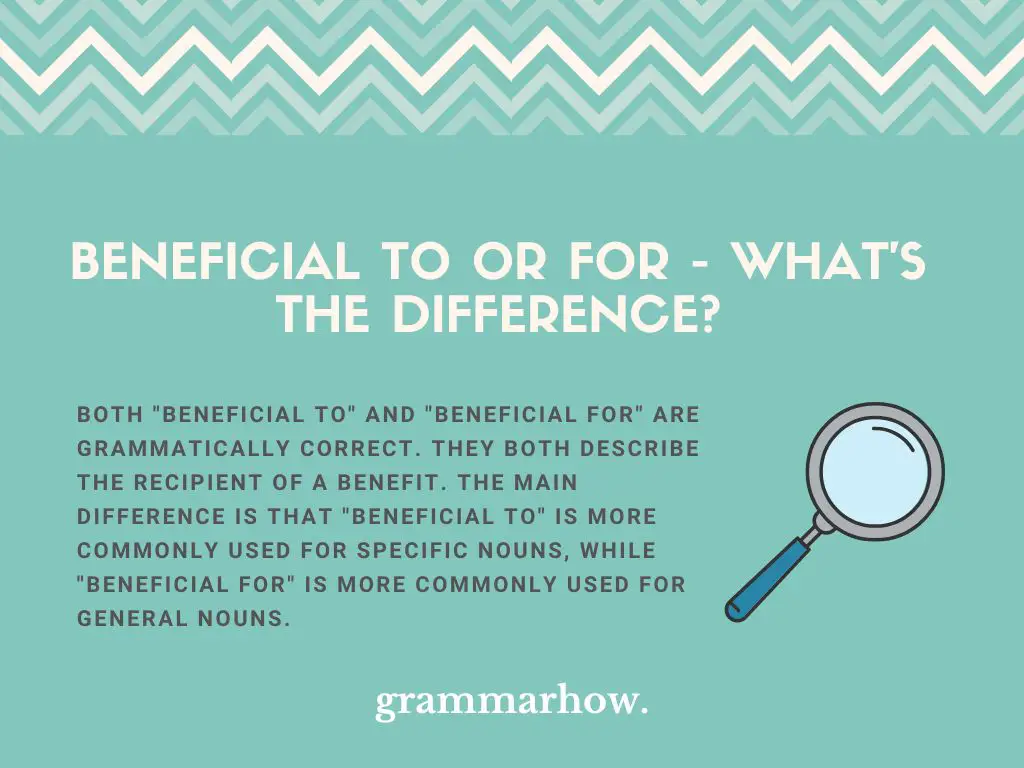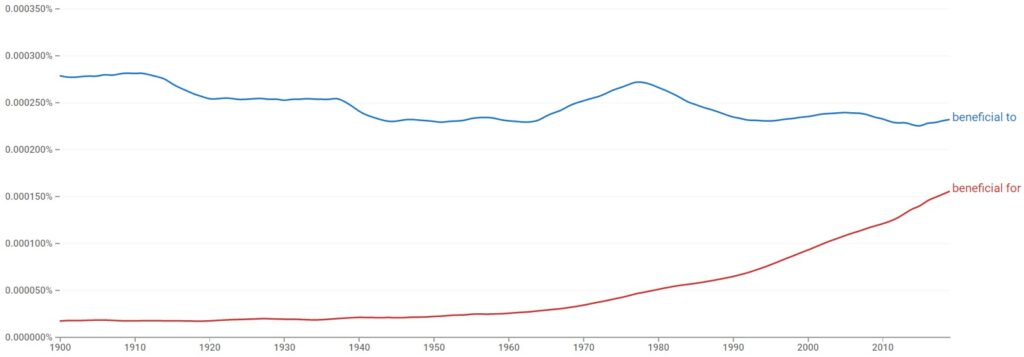It is always good to be a recipient of a benefit, whether it be you or someone else-or maybe even a non-human entity! This article talks about the difference between the phrases “beneficial to” and “beneficial for”, and when to use either phrase.
Beneficial To or For – What’s the Difference?
Both “beneficial to” and “beneficial for” are grammatically correct. They both describe the recipient of a benefit. The main difference is that “beneficial to” is more commonly used for specific nouns, while “beneficial for” is more commonly used for general nouns.

The phrases “beneficial to” and “beneficial for” are both grammatically correct. The difference lies in the preposition used after the word beneficial.
While “to” and “for” are two different prepositions, they both mean essentially the same thing when used after the word “beneficial”. Both prepositions express use or purpose. It is a phrase used to describe the recipient of the benefit.
However, they are not always synonymous or interchangeable with one another. “Beneficial to” is more commonly used for specific nouns. For example:
- Beneficial to her dog
Meanwhile, “beneficial for” is more commonly used for general nouns, such as:
- Beneficial for healthy living
Beneficial To
The phrase “beneficial to” is used when someone or something is a recipient of a benefit.
The word “beneficial” is defined in the Cambridge Dictionary as “helpful, useful, or good”. Meanwhile, “to” is defined in the same dictionary as “a preposition that is used after some adjectives”. “Beneficial” is an example of an adjective.
Below are some examples of how to use the phrase “beneficial to” in a sentence:
- Your presence here has been quite beneficial to your grandmother’s health.
- Mr. Barnett’s teaching methods are beneficial to his students.
- Lending me your car for the weekend would be very beneficial to me.
- Uncle Gilbert offering us a ride to the airport was beneficial to us.
- Has my reviewer been beneficial to you?
- Having her kids out of the house would probably be beneficial to my mother’s health.
- Improving our public transport system will be beneficial to many people.
Beneficial For
The phrase “beneficial for” is used when you want to talk about someone or something who has received a benefit.
The Cambridge Dictionary defines the word beneficial as “helpful, useful, or good”. The same dictionary, on the other hand, defines the preposition “for” as “intended to be given to”.
Below are some examples of how to use the phrase “beneficial for” in a sentence:
- Online learning has been very beneficial for me because my school is so far away from my house.
- The new tree planting project has been beneficial for everyone’s health.
- I hope my offer is beneficial to you, as I only want what is best for you and your family.
- When you made the decision to buy that expensive car, did you not even consider what would be beneficial for us?
- Honestly, I don’t know what to do anymore…all I want is what’s beneficial for her.
- My boyfriend is so selfish; he only ever thinks about what is beneficial for him.
- My son always considers what would be beneficial for the greater good whenever he makes a decision.
Which Is Used the Most?
“Beneficial to” is more commonly used than “beneficial for”, based on data from Google Ngram Viewer.
Google Ngram Viewer allows us to compare how often certain phrases (like “beneficial for” and “beneficial to”) are used in a wide range of books.

Based on data from books written in English that were published between the years 1900 to 2019, we can observe that the phrase “beneficial to” is more popular than “beneficial for”.
Interestingly, the difference in popularity between the two is currently not that large. However, “beneficial to” has consistently been more popular than “beneficial for” from the years 1900 up to 2019.
The phrase “beneficial for” only began to rise in popularity in the 1960s, and has been steadily increasing since then.
Final Thoughts
When you want to describe something good that someone or something receives, you can use the phrases “beneficial to” and “beneficial for”. Both are subtly different from one another in that “beneficial to” is more commonly used for specific nouns, while “beneficial for” is more commonly used for general nouns.

Martin holds a Master’s degree in Finance and International Business. He has six years of experience in professional communication with clients, executives, and colleagues. Furthermore, he has teaching experience from Aarhus University. Martin has been featured as an expert in communication and teaching on Forbes and Shopify. Read more about Martin here.
